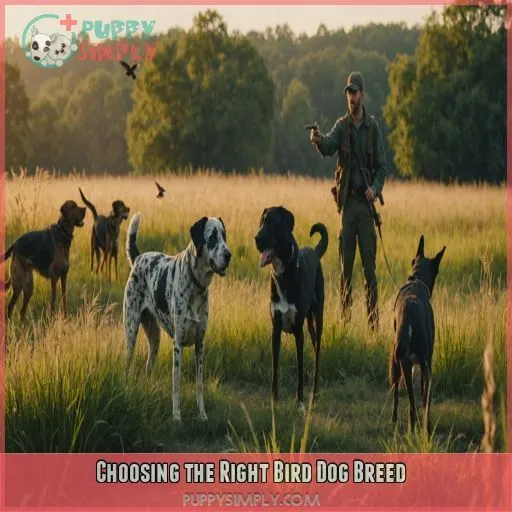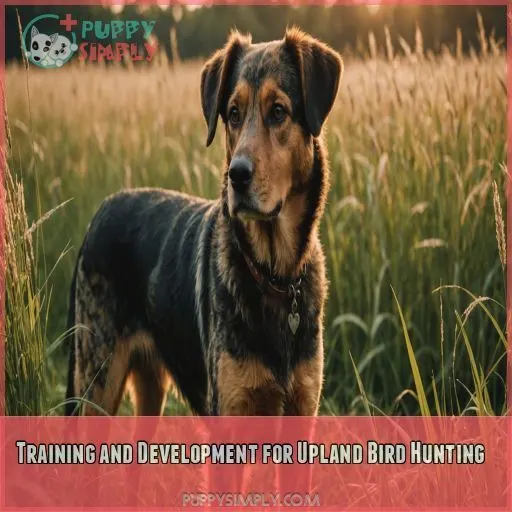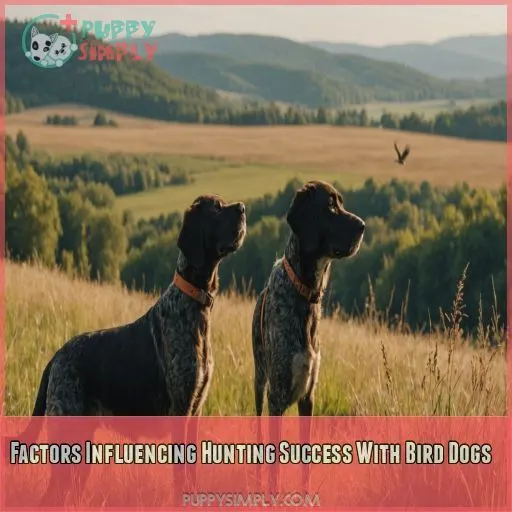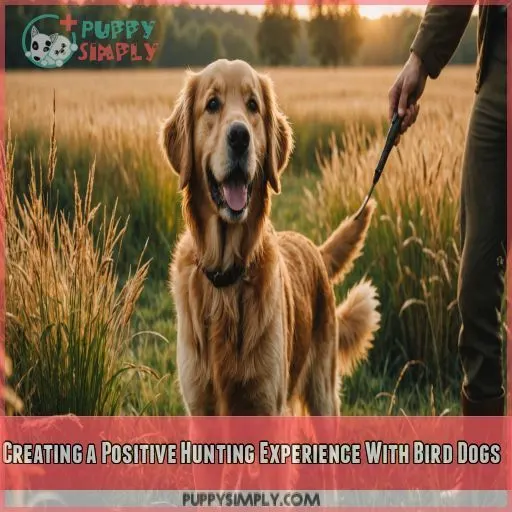This site is supported by our readers. We may earn a commission, at no cost to you, if you purchase through links.

Choosing the right breed can be a tough decision, but don’t worry, we’re here to help.
Look for breeds with strong hunting genetics, like German Shorthaired Pointers or Labradors, which excel in various hunting disciplines.
Consider your hunting style and the terrain you’ll be tackling.
A good bird dog needs to be trainable, energetic, and love the thrill of the chase.
With the right breed by your side, you’ll be bagging those upland birds in no time.
But, what makes a breed truly great?
Table Of Contents
- Key Takeaways
- Choosing the Right Bird Dog Breed
- Training and Development for Upland Bird Hunting
- Factors Influencing Hunting Success With Bird Dogs
- Creating a Positive Hunting Experience With Bird Dogs
- Frequently Asked Questions (FAQs)
- What is the best dog for upland bird hunting?
- What is the easiest dog to train for bird hunting?
- What is the best dog for grouse hunting?
- Are labs good upland bird dogs?
- What breed is best for pointing vs. retrieving?
- How do I find a good breeder?
- What training methods are best for bird dogs?
- How much time does training take?
- How do I know if my dog is ready?
- Conclusion
Key Takeaways
- You’re not just looking for a dog – you’re looking for a partner in crime that’ll make your upland bird hunting adventures unforgettable. So, choose a breed with strong hunting genetics, like German Shorthaired Pointers or Labradors, which excel in various hunting disciplines.
- Don’t fall for breed stereotypes! Your hunting style and dog’s individual talents are key to success. Focus on building a strong connection through training and shared experiences – this is where the magic happens, and memories are made.
- When choosing a bird dog breed, think about your hunting style and the breed’s characteristics. Consider the terrain you’ll be hunting in and the type of game you’ll be pursuing. For example, if you’re after grouse, you’ll want a dog with drive, endurance, and a sharp nose, like an English Setter.
- Training your bird dog is a significant investment – we’re talking hours, days, and weeks of consistent practice and patience. But trust us, the payoff is worth it for a well-trained bird dog that’ll be your loyal companion on countless adventures.
Choosing the Right Bird Dog Breed
Picking the right bird dog breed is key for a successful upland hunting adventure. You’ll want to think about your hunting style, research breed characteristics, and pick a pup that’s keen to please, easy to train, and adaptable to different conditions.
Researching Breeders and Hunting Genetics
When choosing the right bird dog breed, start by researching breeders and hunting genetics. Look for a breeder with a strong pedigree and lineage, and consider genetic testing to check the dog’s health. A reputable breeder will prioritize ethical breeding and be transparent about potential health issues.
Considering Hunting Style and Breed Characteristics
When choosing a bird dog breed, think about your hunting style and the breed’s characteristics. Think about the terrain you’ll be hunting in and the type of game you’ll be pursuing. Here are some key factors to keep in mind:
- Retriever vs. pointer: Which style of hunting do you prefer?
- Bird dog needs: What’re the breed’s specific needs and requirements?
- Terrain suitability: Which breeds are best suited for your hunting terrain?
Meeting the Dog and Evaluating Temperament
When meeting a potential hunting dog, evaluate its temperament by observing its energy level, socialization needs, and fear assessment. Consider whether the dog’s owner fit is a good match for your hunting style and needs. Assess the dog’s hunting drive and temperament, and research the breed’s characteristics to make sure they match your expectations.
Understanding Breed-Specific Health Concerns
When choosing a bird dog breed, you’ll want to think about breed-specific health concerns. Here are three key things to keep in mind:
- Health screening: Look for breeders who prioritize health testing and genetic screening.
- Genetic testing: Consider genetic testing to identify potential health issues.
- Breed longevity: Research the breed’s average lifespan and potential health concerns.
Evaluating the Role of Training and Owner Influence
When choosing the right bird dog breed, think about the role of training and owner influence. A well-trained dog can make all the difference in a successful hunt. Here’s a breakdown of the factors to keep in mind:
| Breed | Training Needs | Owner Dedication | Breed Potential |
|---|---|---|---|
| GSP | High | High | Excellent |
| Labrador | Medium | Medium | Good |
| English Setter | Low | Low | Fair |
| Brittany | Medium | Medium | Good |
| German Wirehaired Pointer | High | High | Excellent |
Training and Development for Upland Bird Hunting
As you embark on your upland bird hunting adventures, it’s essential to understand the importance of training and development for your bird dog. By investing time and effort into your dog’s training, you’ll not only improve their hunting skills but also strengthen the bond between you and your furry companion.
Early Training and Socialization
You’ve got a new furry friend, and it’s time to shape them into a great hunting buddy! Early training and socialization are key to developing good behavior and preventing bad habits. Start with short, fun sessions that focus on obedience, crate training, and potty training. Be consistent, patient, and positive, and you’ll be on the right track.
- Use positive reinforcement techniques, like treats and praise, to encourage good behavior
- Introduce new environments, people, and animals to socialize your pup
- Keep training sessions short and fun to prevent boredom and frustration
- Crate training can help with potty training and reduce separation anxiety
Exposure to Hunting Situations and Environments
As you expose your bird dog to hunting situations and environments, remember that early bird exposure is key. Start with scent training and gradually move to field trials and waterfowl experiences. Puppy socialization is also super important. Introduce your dog to various hunting environments, such as fields, woods, and water, to help them adapt and become a confident hunting companion (Source).
Consistent Training and Positive Reinforcement
Consistency is key when training your bird dog. You want to develop good habits that’ll serve you both well in the field. Here are three tips to keep in mind:
- Set a schedule: Puppy training should happen at the same time every day.
- Use clicker training: Reward-based methods help reinforce good behavior.
- Be patient: Training consistency takes time, so don’t get discouraged!
Building a Strong Bond Between Hunter and Dog
As you work on consistent training and positive reinforcement, remember that building a strong bond with your hunting dog is just as important. Trust, communication, and patience are key. With time, you’ll develop a deep understanding of each other’s quirks and habits. Respect your dog’s individuality, and they’ll reward you with loyalty and excellent hunting skills (Source).
Time Investment and Long-Term Commitment
You’ve built a strong bond with your hunting dog – now it’s time to commit to a long-term training plan. Think of it as a lifestyle change, not a hobby. Here are 4 things to keep in mind:
- Time commitment: 1-2 hours of training, 3-4 times a week.
- Lifestyle adjustments: Waking up early, traveling to hunting spots.
- Relationship building: Nurturing trust, respect, and communication.
- Long-term rewards: A loyal companion and successful hunting trips.
Factors Influencing Hunting Success With Bird Dogs
Hunting success with bird dogs boils down to a few key things that can make or break your adventure. From natural instincts and breed predispositions to individual dog abilities and personal connection, understanding what makes your furry partner tick can be the difference between a mediocre hunt and a truly unforgettable experience.
Natural Instincts and Breed Predispositions
If you’re looking for a dog to hunt upland birds, you want one that’s got the instincts to get the job done. Pointers are naturally wired to locate and point game, while retrievers are born to fetch. Consider a breed’s predispositions when choosing a hunting companion. For example, German Shorthaired Pointers are versatile and excel in various hunting disciplines.
Physical Attributes and Hunting Abilities
You’ve got your eyes on a breed with the right instincts, now it’s time to think about their physical attributes and hunting abilities. Think about the terrain you’ll be hunting in and the type of upland birds you’re after. Here are some key things to keep in mind:
- Size and stamina: Can your dog keep up with you on long hunts?
- Speed and agility: Can they chase down birds in dense cover?
- Coat and conformation: Will they withstand rough terrain and harsh weather?
- Nose and pointing ability: Can they sniff out birds and hold a steady point?
Temperament and Trainability
When you’re looking for a hunting dog breed, temperament and trainability are just as important as physical attributes. You want a dog that’s keen to please and quick to learn. Look for breeds with a reputation for being highly trainable, like German Shorthaired Pointers and Labradors (Source). Early socialization and positive reinforcement training techniques will also help you develop a strong bond with your dog.
Adaptability and Health Considerations
When you’re picking out your dream hunting dog, remember that how well they adapt and their health are super important for success. Here are three things to keep in mind:
- Breed-specific health issues: Do your research on common health problems for your chosen breed and factor in potential vet bills.
- Terrain and weather resilience: Pick a breed that can handle the terrain and weather conditions you’ll be hunting in.
- Diet and exercise needs: Make sure you can provide the necessary nutrition and exercise for your dog to thrive.
Individual Dog Abilities and Personal Connection
Now that we’ve covered adaptability and health, let’s talk about what really matters – the bond between you and your dog. Your hunting style and dog’s individual talents are key to success. Don’t fall for breed stereotypes! Focus on building a strong connection through training and shared experiences. This is where the magic happens, and memories are made.
Creating a Positive Hunting Experience With Bird Dogs
You’ve got your bird dog, and now it’s time to create a positive hunting experience for both of you. By focusing on respect, understanding, and a supportive community, you can make sure that every upland birding adventure is a blast – for you, your dog, and the other hunters you meet along the way.
Avoiding Insults and Respecting Individual Choices
Let’s be honest – we all have our favorite hunting dog breeds. But to build a strong community, we need to respect everyone’s choices. Here’s how:
- Don’t trash-talk someone’s dog breed – it’s their loyal companion, after all.
- Keep an open mind and ask questions about other breeds.
- Focus on fair competition, not criticizing others’ choices.
Fostering a Supportive and Respectful Community
You’re part of a vibrant community that shares your passion for upland birding adventures! To foster a supportive and respectful community, focus on shared passion, not individual differences. Join hunting dog clubs, attend community events, and engage in respectful debates. Offer positive feedback and encouragement to fellow hunters. Here’s a community-building blueprint:
| Community Building | Benefits | Tips |
|---|---|---|
| Join hunting dog clubs | Network with fellow hunters | Be open-minded and respectful |
| Attend community events | Learn from experts, share experiences | Ask questions, offer feedback |
| Engage in respectful debates | Broaden perspectives, build relationships | Focus on shared passion, avoid criticism |
Understanding Individual Dogs and Their Abilities
You’ve got a new furry hunting buddy, and you’re excited to hit the fields together. But remember, every dog is unique, with its own personality, training needs, and hunting style. Don’t assume your new pup will be just like your old one. Take time to understand their breed temperament, individual strengths, and quirks to reach their full potential.
Encouraging Positive Interactions and Shared Passion
Now that you understand the importance of recognizing individual dogs and their abilities, it’s time to focus on encouraging positive interactions and shared passion within the hunting community. Here are three ways to do so:
- Attend community events, such as dog shows and hunting meets, to connect with fellow hunters and dog owners.
- Share stories of your hunting adventures and listen to others’ experiences with respect and enthusiasm.
- Use respectful language when discussing different hunting dog breeds and their owners, promoting a sense of belonging and camaraderie.
Frequently Asked Questions (FAQs)
What is the best dog for upland bird hunting?
You’re chasing a wing-shooting thrill with a trusty companion by your side. The German Shorthaired Pointer leads the pack for upland bird hunting, with their versatility and keen senses, they’re a hunter’s best friend.
What is the easiest dog to train for bird hunting?
You want a bird dog that’s keen to please and quick to learn. The key is early training – the sooner you start, the better. Go with a breed known for its smarts and willingness to obey, like a Labrador Retriever.
What is the best dog for grouse hunting?
You want a dog with drive, endurance, and a sharp nose for grouse hunting. The English Setter is a solid choice, known for its hunting prowess and a keen sense of smell to detect grouse.
Are labs good upland bird dogs?
Labs are great upland bird dogs. They’re natural retrievers with a strong prey drive. Their popularity with the upland hunting community speaks for itself, and they’re especially loved by Baby Boomers.
What breed is best for pointing vs. retrieving?
You want a dog that points, not one that plays fetch? Pointing breeds like the English Setter or Brittany are your hunting buddies. These dogs are keen to please and will readily point out the prey.
How do I find a good breeder?
You want a pup with hunting chops? Research breeders who focus on hunting traits and temperament. Meet the pup and breeder — a good breeder will be proud to show off their pups’ skills and happy homes.
What training methods are best for bird dogs?
Training your bird dog? Start early, expose ’em to hunting environments, and keep it consistent. Positive reinforcement works best — encourage good behaviors and build a strong bond. It’s an investment, but so worth it!
How much time does training take?
You’re wondering how much time training takes? Honestly, it’s a significant investment – we’re talking hours, days, and weeks of consistent practice and patience. But trust us, the payoff is worth it for a well-trained bird dog.
How do I know if my dog is ready?
Think of training like baking a cake – it’s done when all the ingredients come together. Your dog is ready when they consistently obey commands, stay focused, and demonstrate good hunting instincts in various situations.
Conclusion
So you’ve found the perfect hunting buddy, but are you ready for the adventure of a lifetime?
With the right breed by your side, you’ll be unstoppable in the field.
Don’t be afraid to ask questions, seek guidance, and invest time in training.
Your new feathered friends won’t know what hit them!










